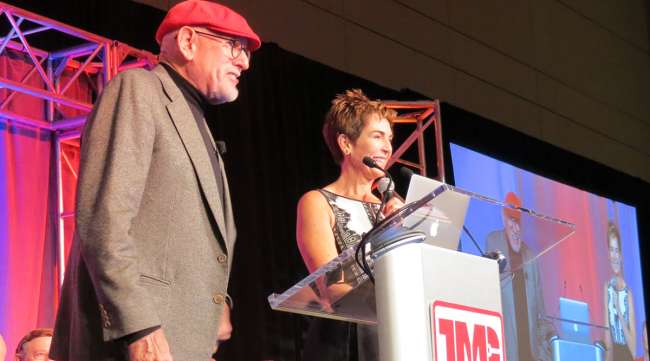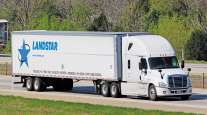Staff Reporter
Millennials Present Challenges, Benefits to Trucking Industry

[Stay on top of transportation news: Get TTNews in your inbox.]
RALEIGH, N.C. — The generation gap between trucking industry leaders is getting wider as younger millennials enter the freight workforce with different understandings of the world around them.
And that world includes the freight industry and the trucking tech sector.
The differences and potential cultural clashes were discussed here at the fall meeting of American Trucking Associations’ Technology & Maintenance Council.
The conversation was led by Meagan Johnson, an author and expert on generational differences. She spoke to the audience of hundreds of trucking industry officials at the Raleigh Convention Center on Sept. 18, joined by her father, Larry Johnson, also an author and speaker on generational problems — and benefits — at U.S. workplaces.
WANT MORE NEWS? Listen to today's Daily Briefing
Meagan Johnson kicked off the luncheon discussion by asking attendees to talk about the positives and frustrations of working with the older generation, if you were a “millennial” and the positives and frustrations of working with the millennials if you were older than them.
Millennials, a much-discussed generation, generally are defined by Meagan Johnson and other experts as the generation born between 1981 and 2000. The generation is so named as they were born just before the change of the millennium in 2000.
Older generations include the “baby boomers,” defined as people born after World War II, between 1946 and 1964, the result of the post-war boom in family growth; and “Generation X,” the group born between 1965 and 1981, Meagan Johnson said.
Millennials have presented new benefits to the older generations because of their tech-savviness and energy.
“They challenge the status quo, and they embrace change,” said Meagan Johnson, a self-described Gen Xer.
Millennials often text too much and don’t excel at verbal communication, an audience member told Meagan Johnson. They speak in “emojis,” the graphical icons used on smartphones.
We use the same negative words to describe every younger generation as it enters the workforce, the marketplace.
Meagan Johnson, expert on generational differences
“There’s a lot of brouhaha about the millennials,” Meagan Johnson said.
But as she listed the complaints, she noted many of the same things were said about the baby boomers in a 1968 issue of “Life” magazine.
In a 1998 issue of “Fortune” magazine, Gen Xers were said to view work as a hobby, she said.
The same cycle of blending younger with older happens regularly, causing change, innovation and often frustrations, she said.
“We use the same negative words to describe every younger generation as it enters the workforce, the marketplace,” Meagan Johnson said. “They have a new, different set of experiences than you do. … We call these experiences generational sign posts, and generational sign posts are events or phenomenons that are specific to one generation.

“And what generational sign posts do is they explain how events, technology and the economy shape various groups of people, clusters of people born in a certain timeframe who have experienced similar situations that can be differentiated from other generations.”
An example would be newspaper delivery, Larry Johnson said. Johnson, a baby boomer, said he delivered newspapers in Phoenix starting when he was 12. He delivered morning papers seven days a week. Now, newspapers are delivered to homes by cars, driven by adults, the Johnsons noted.
The father-daughter duo, who wrote “Generations Inc.,” noted the baby boomer generation was huge, estimated to be 72 million. Many of them are now retiring, they noted, after decades spent reshaping America.
Larry Johnson told the audience his moment of change came when he worked as a young janitor for an aluminum company. He liked his job because he had plenty of freedom, and he could study for college if he did his daily measure of work.
But one time, a coworker offered to help him clean a restroom he was assigned. Larry Johnson said he refused, but the older woman insisted.
Larry Johnson asked the woman why she worked so hard. The woman told Johnson she and her family lost their farm property during the Great Depression. The family lived in a tent near a Phoenix canal for two years and subsisted by finding food that stores threw away, Larry Johnson said.
The Arizona-based aluminum company then offered her a job, and she took it. The job saved her life and her family, she said.
“This was a sign post, a turning point in my life, because I never met anybody so dedicated to a job,” Larry Johnson said. “First of all, it embarrassed me, because I wasn’t. And secondly, I made a commitment right there that I kept to this day, that I would never, ever steal time from my employer like I had been doing. It made a difference in my life.”
Larry Johnson said there are many stories like the woman’s, forged through the generations, and they need to be shared with millennials and younger people to inspire them.

Braswell
“I want to encourage you to share your stories as a way to help these millennials become the leaders of their industry,” Larry Johnson said.
TMC Executive Director Robert Braswell told Transport Topics the presentation was insightful, helping trucking officials realize each generation is singled out for overrelying on its new technology of the time. But the generations learn to work with each other, he said.
One unique challenge is that the millennial generation has turned to new learning technology to study truck maintenance, often using YouTube instead of peer-reviewed tech manuals, Braswell said.
The immediacy of internet information can be challenging, and it can present a unique generational challenge to managers accustomed to assigning books for tech preparation, he said. But Braswell said after the event that he sees the generations learning to adapt to each other. “People are people when it comes right down to it.”





